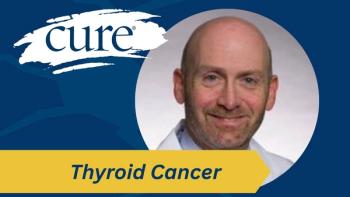
Practical Advice and Resources for Patients on Systemic Therapy for DTC
Shared practical advice for patients who may be undergoing treatment for iodine-refractory differentiated thyroid cancer.
Episodes in this series

Transcript:
Lori Wirth, MD: You’re setting us up to talk about second-line therapy, which is great. First, I want to ask Jim and Molly, and then Gary, are there other resources that you found as patients and advocates that are helpful for side effect management? Jim mentioned the dietitian support, which I think can indeed be helpful, but Jim and Molly, do you have any other pearls of wisdom in terms of resources that you found helpful to manage the overall situation?
Molly Lesniak: Stock up on Gatorade.
Lori Wirth, MD: Or invest in Gatorade.
Molly Lesniak: Yeah. Invest, but stock up on it, because that gets him through a lot of it. If he’s had a bad day, especially after we did the trip to the emergency department, they said he needs to rehydrate. Some of those drinks have to be Gatorade. He has Gatorade two to three times a day, or at least twice a day.
Jim Lesniak: Also, we’re walking four to five miles a day and that’s a big plus there, too.
Lori Wirth, MD: In what regard? I love to hear you say that, but what does that do for you?
Jim Lesniak: It keeps your strength up. Your heart and everything else; you feel good.
Molly Lesniak: It’s good for his mental health, too.
Jim Lesniak: I’m away from all my doctors. They’ll do house calls because it’s warmer.
Lori Wirth, MD: Gary, do you have any other suggestions on resources available to patients for dealing with side effects?
Gary Bloom: I’m a fan of talking to other people, comparing notes because somebody always has another suggestion. I’m sure there are people who don’t care for Gatorade and it’s nice to know that there are alternatives to Gatorade ... Pedialyte, all of a sudden, is making a big comeback. It’s not just for when we were raising our babies; now, it’s for adults too. Be aware that you might not enjoy the taste of something and there might be an alternative or there might be something that works nearly as well. Again, I think it’s good to talk to other patients about that, talk to your physicians, and I like the idea of trying to hook up with a nutritionist who maybe you can just have an email tethered to in case you need a change. As we age, our bodies change and we can’t digest things the same way. There are natural changes happening and then there are drug-induced changes happening. We’re a very dynamic population when we’re going through these kinds of things, so it’s important to just be flexible.
Bryan McIver, MD: Lori, the other resources that I would throw into the equation — I mentioned earlier the pharmacists. Typically, any large hospital system is going to have some highly professional, well-educated pharmacists who really understand the drug-drug interactions, if you’re on more than one or two medications, as well as the lenvatinib [Lenvima]. It’s important to understand that those drugs can interact with one another. They also understand the side effect profile of these drugs and can often help us with drug-based alternatives to manage the side effect profile: blood pressure control, nausea, diarrhea control. All of these things also have not just nutritional input but also drug-based input.
Certainly, the nutritionist, as you’ve mentioned already, is central because with the diarrhea comes potential for weight loss and with weight loss comes muscle loss and with muscle loss comes an inability to tolerate some of the drugs, and deconditioning is really bad for people trying to battle cancer. Physical therapy and supportive care type of strategies also help, where we have people learning how best to exercise and manage it. Psychology and psychiatry often play a role because we’re dealing with disease that cannot be cured and that has psychological impact. Beyond the peer support of having a supportive spouse or partner, which Jim and Molly have modeled perfectly today, having access to nonprofessional patient support groups and having a whole array of professionals in the background available and guiding … is tremendously important.
Transcript edited for clarity.





